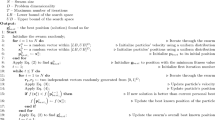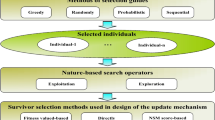Abstract
In recent decades with the increase in the complexity of the problems, the need for high-performance and scalable optimization tools has been inevitable. Among different phenomena introduced to optimization problems, naturally inspired algorithms are favored. Also, encountering large-scale problems, high-performance tools like parallel implementations should be needed. In order to tackle this problem, the framework has been proposed that can wrap any swarm algorithm into an outperformer parallel and hybrid version. Six accepted swarm algorithms are selected to evaluate performance and compare the wrapped version with standard versions. Six nonlinear high-dimension benchmark functions are used to test the proposed algorithms. The experimental results show that wrapped versions outperform standard versions with the measurement of average best fitness.









Similar content being viewed by others
Data availability
All data generated or analyzed during this study are included in this published article.
References
Nguyen, B.H., Xue, B., Zhang, M.: A survey on swarm intelligence approaches to feature selection in data mining. Swarm Evol. Comput. 54, 100663 (2020). https://doi.org/10.1016/J.SWEVO.2020.100663
Sayed, G.I., Darwish, A., Hassanien, A.E.: Binary whale optimization algorithm and binary moth flame optimization with clustering algorithms for clinical breast cancer diagnoses. J. Classif. 37(1), 66–96 (2019). https://doi.org/10.1007/S00357-018-9297-3
Cinque, L., De Agostino, S., Lombardi, L.: Binary image compression via monochromatic pattern substitution: sequential and parallel implementations. Math. Comput. Sci. 7(2), 155–166 (2013). https://doi.org/10.1007/S11786-013-0153-X
Chang, C.C., Wu, T.H., Wu, C.W.: An efficient approach to determine cell formation, cell layout and intracellular machine sequence in cellular manufacturing systems. Comput. Ind. Eng. 66(2), 438–450 (2013). https://doi.org/10.1016/J.CIE.2013.07.009
Iyer, L.R., Ho, S.B.: A connectionist model of data compression in memory. Biol. Inspired Cogn. Archit. 6, 58–66 (2013). https://doi.org/10.1016/J.BICA.2013.06.005
Chandrasekaran, K., Simon, S.P., Padhy, N.P.: Binary real coded firefly algorithm for solving unit commitment problem. Inf. Sci. (Ny) 249, 67–84 (2013). https://doi.org/10.1016/J.INS.2013.06.022
Kennedy, J., Eberhart, R.C.: Discrete binary version of the particle swarm algorithm. Proc IEEE Int. Conf. Syst. Man Cybern. 5, 4104–4108 (1997). https://doi.org/10.1109/ICSMC.1997.637339
Lv, C., Zhao, H., Yang, X.: Particle swarm optimization algorithm for quadratic assignment problem. Proc. 2011 Int. Conf. Comput. Sci. Netw. Technol. ICCSNT 2011 3, 1728–1731 (2011). https://doi.org/10.1109/ICCSNT.2011.6182302
Krause, J., Cordeiro, J., Parpinelli, R.S., Lopes, H.S.: A Survey of swarm algorithms applied to discrete optimization problems. Swarm Intell. Bio-Inspired Comput. Theory Appl. (2013). https://doi.org/10.1016/B978-0-12-405163-8.00007-7
Falcón-Cardona, J.G., Hernández Gómez, R., Coello Coello, C.A., Castillo Tapia, M.G.: “Parallel multi-objective evolutionary algorithms: a comprehensive survey. Swarm Evol. Comput. 67, 100960 (2021). https://doi.org/10.1016/J.SWEVO.2021.100960
Talbi, E.G.: A unified view of parallel multi-objective evolutionary algorithms. J. Parallel Distrib. Comput. 133, 349–358 (2019). https://doi.org/10.1016/J.JPDC.2018.04.012
Pellerin, R., Perrier, N., Berthaut, F.: A survey of hybrid metaheuristics for the resource-constrained project scheduling problem. Eur. J. Oper. Res. 280(2), 395–416 (2020). https://doi.org/10.1016/J.EJOR.2019.01.063
Mohammadi, M., Fazlali, M., Hosseinzadeh, M.: An effective hybrid genetic algorithm and tabu search for maximizing network lifetime using coverage sets scheduling in wireless sensor networks. J. Supercomput. (2022). https://doi.org/10.1007/S11227-022-04710-1/FIGURES/12
Potter, M.A., De Jong, K.A.: A cooperative coevolutionary approach to function optimization. Lect. Notes Comput. Sci. (including Subser. Lect. Notes Artif. Intell. Lect. Notes Bioinformatics) 866, 249–257 (1994). https://doi.org/10.1007/3-540-58484-6_269/COVER
Mahdavi, S., Shiri, M.E., Rahnamayan, S.: Metaheuristics in large-scale global continues optimization: a survey. Inf. Sci. (Ny) 295, 407–428 (2015). https://doi.org/10.1016/J.INS.2014.10.042
Yang, Z., Tang, K., Yao, X.: Differential evolution for high-dimensional function optimization. 2007 IEEE Congr Evol. Comput. CEC 2007, 3523–3530 (2007). https://doi.org/10.1109/CEC.2007.4424929
Li, X., Yao, X.: Tackling high dimensional non-separable optimization problems by cooperatively coevolving particle swarms. 2009 IEEE Congr. Evol. Comput. CEC 2009, pp. 1546–1553 (2009) doi: https://doi.org/10.1109/CEC.2009.4983126
Ipchi Sheshgelani, M., Pashazadeh, S., Salehpoor, P.: Cooperative hybrid consensus with function optimization for blockchain. Clust. Comput. (2022). https://doi.org/10.1007/S10586-022-03746-5
Kennedy, J., Eberhart, R.: Particle swarm optimization. Proc. ICNN'95—Int. Conf. Neural Networks, vol. 4, pp. 1942–1948 (1942) doi: https://doi.org/10.1109/ICNN.1995.488968
Shen, X., Li, Y., Chen, C., Yang, J., Zhang, D.: Greedy continuous particle swarm optimization algorithm for the knapsack problems. Int. J. Comput. Appl. Technol. 44(2), 137–144 (2012). https://doi.org/10.1504/IJCAT.2012.048684
Lopes, H.S., Coelho, L.S.: Particle swarm optimization with fast local search for the blind travelling salesman problem. Proc. —HIS 2005 Fifth Int. Conf. Hybrid Intell. Syst., vol. 2005, pp. 245–250 (2005) https://doi.org/10.1109/ICHIS.2005.86.
Yang, X.S, Deb, S.: Cuckoo search via Lévy flights. 2009 World Congr. Nat. Biol. Inspired Comput. NABIC 2009 - Proc. pp. 210–214 (2009) https://doi.org/10.1109/NABIC.2009.5393690.
Mareli, M., Twala, B.: An adaptive Cuckoo search algorithm for optimisation. Appl. Comput. Inform 14(2), 107–115 (2018). https://doi.org/10.1016/J.ACI.2017.09.001
Burnwal, S., Deb, S.: Scheduling optimization of flexible manufacturing system using cuckoo search-based approach. Int. J. Adv. Manuf. Technol. 64(5), 951–959 (2012). https://doi.org/10.1007/S00170-012-4061-Z
Layeb, A., Boussalia, S.R.: A novel quantum inspired cuckoo search for knapsack problems. Int.J. Inform. Technol Comput. Sci. 5, 58–67 (2012). https://doi.org/10.5815/ijitcs.2012.05.08
Heidari, A.A., Mirjalili, S., Faris, H., Aljarah, I., Mafarja, M., Chen, H.: Harris hawks optimization: algorithm and applications. Futur. Gener. Comput. Syst. 97, 849–872 (2019). https://doi.org/10.1016/J.FUTURE.2019.02.028
"Harris Hawks optimization (HHO) Explained | Papers With Code." https://paperswithcode.com/method/hho (accessed Nov. 13, 2022).
Bao, X., Jia, H., Lang, C.: A Novel hybrid harris hawks optimization for color image multilevel thresholding segmentation. IEEE Access 7, 76529–76546 (2019). https://doi.org/10.1109/ACCESS.2019.2921545
Mirjalili, S., Lewis, A.: The whale optimization algorithm. Adv. Eng. Softw. 95, 51–67 (2016). https://doi.org/10.1016/J.ADVENGSOFT.2016.01.008
Yang, X.S., He, X.S.: Why the firefly algorithm works? Stud. Comput. Intell. 744, 245–259 (2018). https://doi.org/10.1007/978-3-319-67669-2_11/COVER
. Falcon, R., Almeida, M., Nayak, A.:Fault identification with binary adaptive fireflies in parallel and distributed systems. 2011 IEEE Congr. Evol. Comput. CEC 2011, pp. 1359–1366 (2011). doi: https://doi.org/10.1109/CEC.2011.5949774.
Selvakumar, B., Muneeswaran, K.: Firefly algorithm based feature selection for network intrusion detection. Comput. Secur. 81, 148–155 (2019). https://doi.org/10.1016/J.COSE.2018.11.005
Al-Tashi, Q., Abdul Kadir, S.J., Rais, H.M., Mirjalili, S., Alhussian, H.: Binary optimization using hybrid grey wolf optimization for feature selection. IEEE Access 7, 39496–39508 (2019). https://doi.org/10.1109/ACCESS.2019.2906757
Li, J., Gonsalves, T.: Parallel Hybrid Island Metaheuristic Algorithm. IEEE Access 10, 42254–42272 (2022). https://doi.org/10.1109/ACCESS.2022.3165830
Dokeroglu, T., Pehlivan, S., Avenoglu, B.: Robust parallel hybrid artificial bee colony algorithms for the multi-dimensional numerical optimization. J. Supercomput. 76(9), 7026–7046 (2020). https://doi.org/10.1007/S11227-019-03127-7/TABLES/8
J. J.— Reading, M. Addison-Wesley, and undefined 1992, "An introduction to parallel algorithms," cs.utah.edu, Accessed: Nov. 07, 2022. [Online]. Available: https://www.cs.utah.edu/~hari/teaching/bigdata/book92-JaJa-parallel.algorithms.intro.pdf
Salomon, R.: Short notes on the schema theorem and the building block hypothesis in genetic algorithms. Lect. Notes Comput. Sci (including Subser. Lect. Notes Artif. Intell. Lect. Notes Bioinformatics) 1447, 113–122 (1998). https://doi.org/10.1007/BFB0040765/COVER
Funding
No funding was received to assist with the preparation of this manuscript.
Author information
Authors and Affiliations
Contributions
MIS: Conceptualization, Methodology, Implementing, Review, and Editing. SP: Supervision, Validating, Reviewed, and Edited. PS: Reviewing.
Corresponding author
Ethics declarations
Conflict of interest
The authors have no competing interests to declare relevant to this article's content.
Additional information
Publisher's Note
Springer Nature remains neutral with regard to jurisdictional claims in published maps and institutional affiliations.
Rights and permissions
Springer Nature or its licensor (e.g. a society or other partner) holds exclusive rights to this article under a publishing agreement with the author(s) or other rightsholder(s); author self-archiving of the accepted manuscript version of this article is solely governed by the terms of such publishing agreement and applicable law.
About this article
Cite this article
Ipchi Sheshgelani, M., Pashazadeh, S. & Salehpoor, P. Framework for wrapping binary swarm optimizers to the hybrid parallel cooperative coevolving version. Cluster Comput 27, 1683–1697 (2024). https://doi.org/10.1007/s10586-023-04029-3
Received:
Revised:
Accepted:
Published:
Issue Date:
DOI: https://doi.org/10.1007/s10586-023-04029-3




